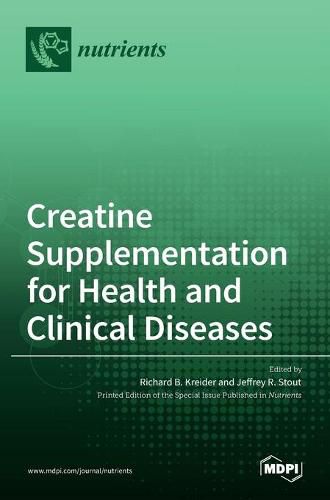Readings Newsletter
Become a Readings Member to make your shopping experience even easier.
Sign in or sign up for free!
You’re not far away from qualifying for FREE standard shipping within Australia
You’ve qualified for FREE standard shipping within Australia
The cart is loading…






This title is printed to order. This book may have been self-published. If so, we cannot guarantee the quality of the content. In the main most books will have gone through the editing process however some may not. We therefore suggest that you be aware of this before ordering this book. If in doubt check either the author or publisher’s details as we are unable to accept any returns unless they are faulty. Please contact us if you have any questions.
Creatine plays a critical role in cellular metabolism, primarily by binding with phosphate to form phosphocreatine (PCr) as well as shuttling high-energy phosphate compounds in and out of the mitochondria for metabolism. Increasing the dietary availability of creatine increases the tissue and cellular availability of PCr, and thereby enhances the ability to maintain high-energy states during intense exercise. For this reason, creatine monohydrate has been extensively studied as an ergogenic aid for exercise, training, and sport. Limitations in the ability to synthesize creatine and transport and/or store dietary creatine can impair metabolism and is a contributor to several disease states. Additionally, creatine provides an important source of energy during metabolically stressed states, particularly when oxygen availability is limited. Thus, researchers have assessed the role of creatine supplementation on health throughout the lifespan, as well as whether creatine availability may improve disease management and/or therapeutic outcomes. This book provides a comprehensive overview of scientific and medical evidence related to creatine’s role in metabolism, health throughout the lifespan, and our current understanding of how creatine can promote brain, heart, vascular and immune health; reduce the severity of musculoskeletal and brain injury; and may provide therapeutic benefits in glucose management and diabetes, cancer therapy, inflammatory bowel disease, and post-viral fatigue.
$9.00 standard shipping within Australia
FREE standard shipping within Australia for orders over $100.00
Express & International shipping calculated at checkout
This title is printed to order. This book may have been self-published. If so, we cannot guarantee the quality of the content. In the main most books will have gone through the editing process however some may not. We therefore suggest that you be aware of this before ordering this book. If in doubt check either the author or publisher’s details as we are unable to accept any returns unless they are faulty. Please contact us if you have any questions.
Creatine plays a critical role in cellular metabolism, primarily by binding with phosphate to form phosphocreatine (PCr) as well as shuttling high-energy phosphate compounds in and out of the mitochondria for metabolism. Increasing the dietary availability of creatine increases the tissue and cellular availability of PCr, and thereby enhances the ability to maintain high-energy states during intense exercise. For this reason, creatine monohydrate has been extensively studied as an ergogenic aid for exercise, training, and sport. Limitations in the ability to synthesize creatine and transport and/or store dietary creatine can impair metabolism and is a contributor to several disease states. Additionally, creatine provides an important source of energy during metabolically stressed states, particularly when oxygen availability is limited. Thus, researchers have assessed the role of creatine supplementation on health throughout the lifespan, as well as whether creatine availability may improve disease management and/or therapeutic outcomes. This book provides a comprehensive overview of scientific and medical evidence related to creatine’s role in metabolism, health throughout the lifespan, and our current understanding of how creatine can promote brain, heart, vascular and immune health; reduce the severity of musculoskeletal and brain injury; and may provide therapeutic benefits in glucose management and diabetes, cancer therapy, inflammatory bowel disease, and post-viral fatigue.